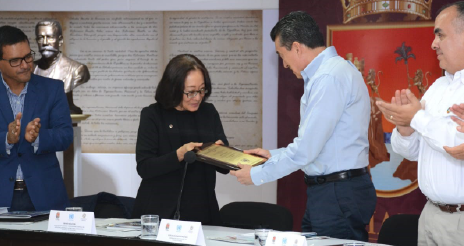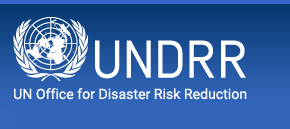- Our Mandate
- Mission and Objectives
- UNDRR in the UN
- Work Programme & Annual Reports
- Results Based System
- Work Partnerships
- Headquarters - Geneva
- SG-UN representatives for DRR
- Regional Office – The Americas and the Caribbean
- Head of the Regional Office – The Americas and the Caribbean
- What is Disaster Risk Reduction?
- What is the International Strategy?
- History of UNDRR
UNDRR Head to see how Mexico's Chiapas builds resilience
 Photo description: Mami Mitzutori, Special Representative of the United Nations Secretary-General for Disaster Risk Reduction and head of UNDRR gives special recognition to the State of Chiapas for their advances in the implementation of the Making Cities Resilient Campaign and the safe school programme. The recognition was received by Rutilio Escandón, Governor of Chiapas. Photo credits: Promotion department of the General Secretary of Chiapas Civil Protection
Photo description: Mami Mitzutori, Special Representative of the United Nations Secretary-General for Disaster Risk Reduction and head of UNDRR gives special recognition to the State of Chiapas for their advances in the implementation of the Making Cities Resilient Campaign and the safe school programme. The recognition was received by Rutilio Escandón, Governor of Chiapas. Photo credits: Promotion department of the General Secretary of Chiapas Civil Protection
By: Sophie Shares, UNDRR – Americas and the Caribbean.
PANAMA, Panamá City – 28 October, 2019 - Mami Mitzutori, Special Representative of the Secretary-General of the United Nations for Disaster Risk Reduction and Head of the United Nations Office for Disaster Risk Reduction (UNDRR), visits Mexico's Chiapas state on Monday to see how an earthquake-destroyed village is rebuilding and how community projects are boosting resilience in the country's poorest region.
Exposed to threats ranging from floods and earthquakes to hurricanes, the southern state has thrown its weight behind disaster risk reduction and now has over 7,000 citizen committees to help communities prepare for and recover from devastating events.
"Chiapas has practically the whole catalogue when it comes to dangers," said Luis Manuel Garcia Moreno, Head of the state's civil protection.
"We have a dichotomy, there's a lot of natural resources alongside poverty and marginalization. Reducing disaster risk is a high public policy priority."
More than 70 percent live in poverty in the state that is working towards meeting the targets of the Sendai Framework for Disaster Risk Reduction and the Sustainable Development Goals, he explained.
Mitzutori visit is designed to recognize the significant advances Chiapas has made in implementing the Making Cities Resilient Campaign and a safe schools programme implemented in the state.
She also wants to recognize the dynamic role the state has played in investing in hazard warning systems, training and mitigation.
Mitzutori is scheduled to visit the community of Miguel Hidalgo, where over 200 mainly adobe homes crumpled in the powerful 2017 earthquake that destroyed around 59,000 houses across the state.
Before the quake, the rural community where many speak the indigenous Tzotzil language was vulnerable and marginalized, but extensive rebuilding has brought wide-ranging benefits to the village, said Garcia Moreno.
A number of earthquake-resistant houses with electricity, bathrooms and kitchens have replaced those damaged or destroyed in the village which now has a new community center, clinic and school facilities.
Benjamin Laniado, whose non-profit CADENA led the reconstruction, said much of the community was involved in the rebuild which allowed many to learn employable skills, with the benefits stretching way beyond simply creating safe houses.
"The most important part is not the material but the holistic part, they know they can make changes in their lives if they can work together," said Laniado, whose NGO is now focusing on longer-term development projects for the village.
"They have more security; they have more strength to be resilient."
The school in Miguel Hidalgo is one of the 1,500 in Chiapas working towards safe School and educates children on how to reduce their exposure to risk and then spread their knowledge to the broader community.
The school safety scheme part of the Worldwide Initiative for Safe Schools (WISS), coordinated by UNDRR, encompasses a range of programmes to ensure educational facilities are resilient, while bolstering school disaster management and risk reduction initiatives.
With extreme weather events already on the rise due to a changing climate, Chiapas communities are receptive to schemes such as the prevention committees which receive regular training and use radios to communicate in the rugged terrain, said Moreno Garcia.
But while Chiapas has made progress in reducing its vulnerability, more still needs to be done to ensure adequate building codes are put in place and enforced across the state to protect its infrastructure, he added.
Mitzutori will also visit urban resilience projects in the state capital Tuxtla Gutierrez and the Chiapas campus of the National School for Civil Protection which offers courses up to doctorate level that analyze risks, vulnerabilities and solutions.
External links
https://www.unisdr.org/who-we-are/srsg-drr
https://www.unisdr.org/we/campaign/wiss
Follow the UNDRR news online :
 Now we have twitter account @UNDRR Américas y el Caribe
Now we have twitter account @UNDRR Américas y el Caribe
JOIN US!
Tweets por el @UNDRR Américas y el Caribe
